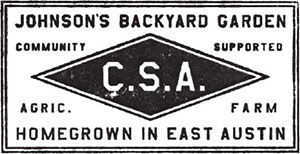
A SECOND LOOK AT PLASTICS
02/12/16 — Farm
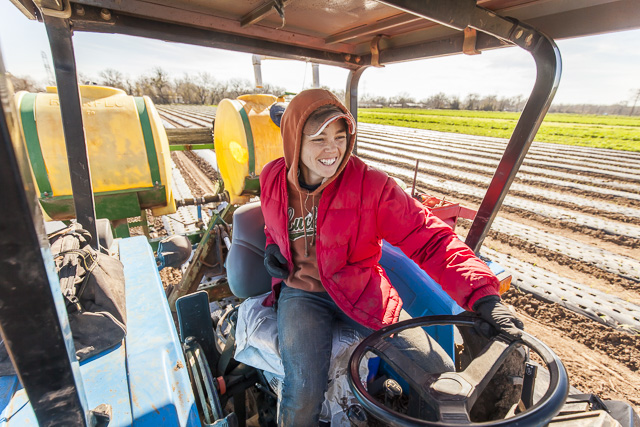 Katie drives the tractor for the transplanting crew. Photo by Scott David Gordon
Katie drives the tractor for the transplanting crew. Photo by Scott David Gordon
From the Farmer's Perspective
I'm an all or nothing kind of guy - perhaps my best and perhaps my worst trait. As I get older (and hopefully wiser), I'm slowly learning that things are not always as black and white as I like to see them, and it's helping me become a better farmer - there's a lot to be said for the middle path! In October 2014, we committed to reducing the our use of plastics at JBG. Our biggest use at the time was plastic mulch in the fields, so naturally, we decided to cut that out. I chose to go all in on this project, stopping our use of plastic mulch cold-turkey, and we learned a lot in the subsequent year. JBG hired a full time weeding crew to tend to our bare soils, and we worked as hard as we could to keep up the farm's productivity.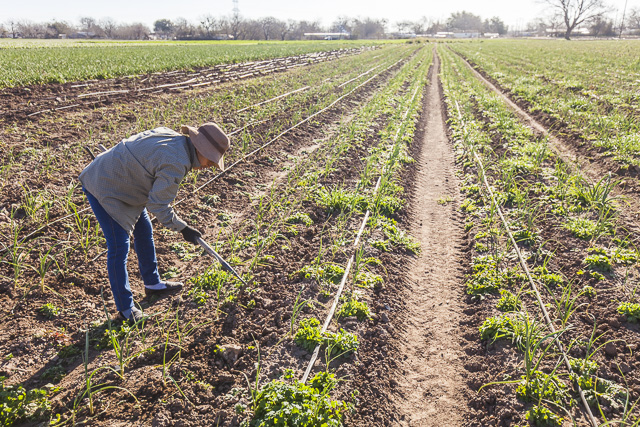 Hand-weeding is a tough task, and we've done a lot of it this year! Photo by Scott David Gordon
Hand-weeding is a tough task, and we've done a lot of it this year! Photo by Scott David Gordon
My staff warned me that jumping in two feet first was a risky move, but I convinced them to push though. I'm incredibly proud of the work we've accomplished since then. Without plastic, we've been battling waist high weeds with all of our efforts - and some serious man (and woman) hand labor. As we are crop planning this year, however, we are re-evaluating our use of plastic mulch. I'm starting to see the more subtle pieces of our farm puzzle, and learning that things are not as black and white as I'd like them to be. This year, we have decided to use plastic mulch in a much more limited capacity, in order to deliver our customers the high quality produce they expect from JBG. For each and every crop, we are weighing the pros and cons of using this technology and making decisions as to where it is appropriate.
Plastic mulches have a lot of benefits in the agricultural world. They keep soil temperatures higher at night, which is very important for lots of our summer crops. We weren't happy with the quality of our peppers and tomatoes last summer, which was due in part to day-night temperature fluctuations. Plastics also drastically reduce weeds and prevent water, soil, and nutrient runoff - this is one lesson we learned the hard way with heavy rain events last year. For shallow rooted crops that do poorly with weed pressure, like our onions, the use of plastic mulch will save us thousands of gallons of precious water and hundreds of hours of hand weeding.
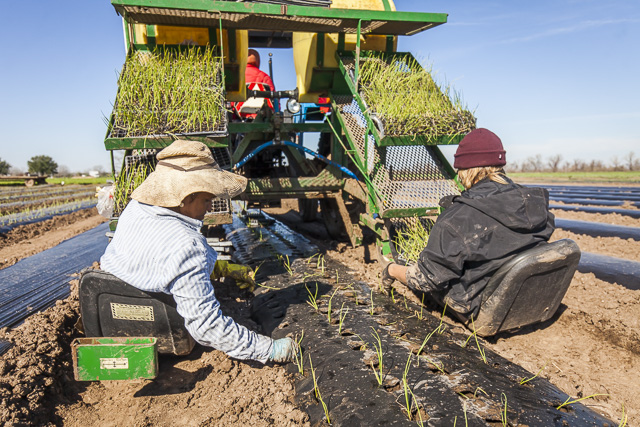 Onions are one crop that we will try again with plastic this year. Photo by Scott David Gordon
Onions are one crop that we will try again with plastic this year. Photo by Scott David Gordon
And the plastic does wonders for our soil's microbial life. It suppresses weeds, saving us many tractor passes over the soil and reducing compaction in the fields. Additionally, the dark and moist environment under the mulch, especially in our hot Texas summers, is the ideal environment for beneficial soil microbes. Without the mulch, the top layer of soil dries out and this biology is forced deeper and deeper to find a suitable home. High microbial activity in our upper soil layers has an additional, maybe less obvious benefit: like you and me, these microorganisms breathe oxygen and excrete carbon dioxide. The carbon dioxide produced under the mulch seeps out through the holes punched for crops, bathing our plants in individual little clouds of carbon dioxide. Along with giving our plants a nice big CO2 boost (like an oxygen bar for humans), we are reducing our greenhouse gas emissions by ensuring that our crops turn this carbon dioxide into oxygen instead of letting it escape into the atmosphere.
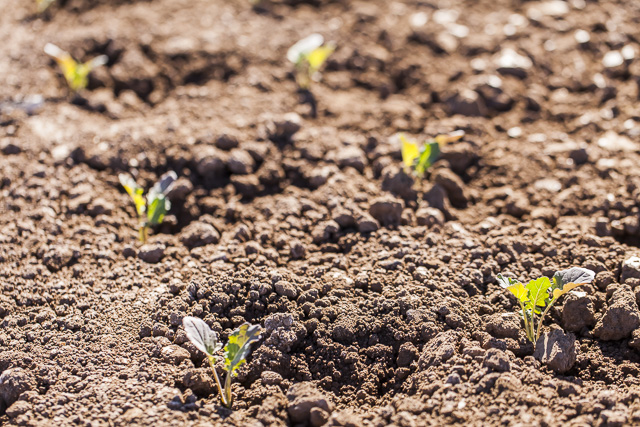 Newly planted brassicas. Photo by Scott David Gordon
Newly planted brassicas. Photo by Scott David Gordon
So, it's time for me to stop seeing the world in black and white and start looking at the bigger, more complex picture. Yes, I want to reduce our use of non-renewable materials and am committed to keeping our use of plastic mulch to a minimum at JBG. We are exploring other alternatives to plastic, including strip tillage and natural mulches like hay. But, we also have to take into account valuable resources like water and topsoil, which plastic undoubtedly helps to conserve. Add in there our labor costs and workloads for the farm crew, which directly affect pricing for our customers as well. Have I mentioned it's not as straightforward as I originally thought? Plastic is still plastic, no matter how you spin it, but with so many things to take into consideration, there is no single right answer. Our hope is to find the best compromise in order to make the best decisions for our farm, our community, and our planet.
For more of the farmer’s perspective, follow Brenton on Facebook, Twitter, or Instagram @farmerbrenton.






 0 ITEMS IN CART
0 ITEMS IN CART 
